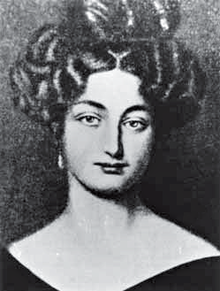Elisabeth Deichmann-Schaaffhausen
Elisabeth Jacobine Eleonore Deichmann-Schaaffhausen (born May 13, 1811 in Cologne ; † July 4, 1888 in Bonn ), called Lilla , was the youngest daughter of the Cologne banker Abraham Schaaffhausen and his second wife Therese De Maes. She was a half-sister of Sibylle Mertens-Schaaffhausen .
Life
Lilla Schaaffhausen married, although Roman Catholic, in 1830 the Protestant Wilhelm Deichmann , who had recently taken over the Schaaffhausen Bank . Together they had four sons and seven daughters. The sons were raised Protestants, the daughters Catholic. In 1836 the family bought a baroque castle near Bonn as a summer residence (today: Deichmannsaue Castle ), which soon became a center of attraction for Bonn society.
Artists and high-ranking personalities frequented here, such as the Prussian Crown Prince couple Wilhelm and Augusta , Clara Schumann , Franz Liszt and Max Bruch . Johannes Brahms is said to have composed his Piano Sonata in C major Op. 1 here in 1853 .
Lilla Deichmann-Schaaffhausen possessed a wide range of talents and became the first female student at Bonn University at the age of 60 , decades before women were officially admitted to study. She studied ophthalmology and even performed a star surgery. In the Franco-Prussian War of 1870/71, she headed a military hospital, initially in Bad Ems until April 1871 , and later in the Wabern hunting lodge near Kassel .
In 1878 Lilla Deichmann-Schaaffhausen became a Liechtenstein citizen and bought herself the citizenship of the community of Schellenberg for 200 Reichsmarks . She also lived for some time at the Löwen inn in Vaduz , but then returned to Germany. In the following years she donated larger sums of money to the State of Liechtenstein and in particular to the community of Schellenberg.
She later joined the Old Catholics and donated the insignia ring, cross, crosier and miter for the first bishop Hubert Reinkens .
literature
- Josef Niesen : Bonn Personal Lexicon. 3rd, improved and enlarged edition. Bouvier, Bonn 2011, ISBN 978-3-416-03352-7 .
Web links
Individual evidence
- ↑ Cornelius Goop: Rich and famous Schellenberger . In: Schellenberg My Magazine . Schellenberg July 2020, p. 34-37 ( gmgnet.li ).
| personal data | |
|---|---|
| SURNAME | Deichmann-Schaaffhausen, Elisabeth |
| ALTERNATIVE NAMES | Deichmann-Schaaffhausen, Elisabeth Jacobine Eleonore (full name); Lilla |
| BRIEF DESCRIPTION | German banker's wife, first student at Bonn University |
| DATE OF BIRTH | May 13, 1811 |
| PLACE OF BIRTH | Cologne |
| DATE OF DEATH | 4th July 1888 |
| Place of death | Bonn |
